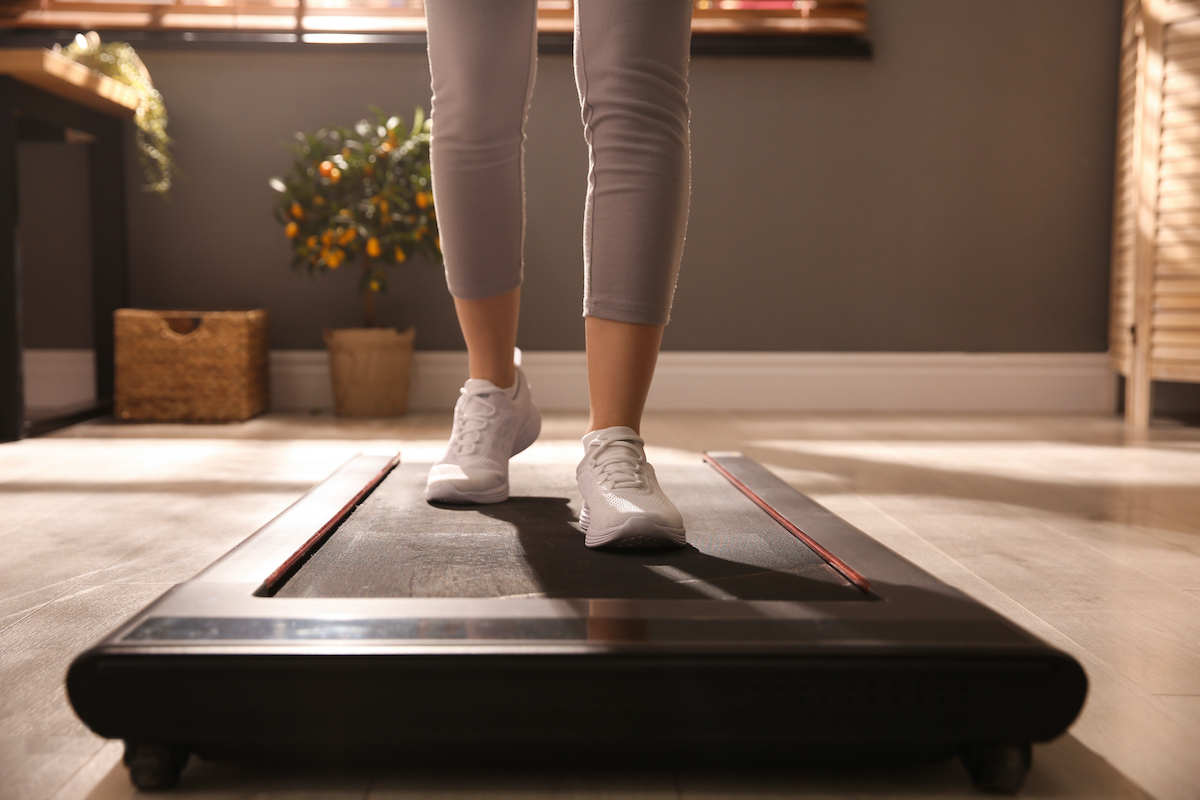Getting Older? Sitting for This Long Every Day Is Dangerous, Says Study

If you feel like you spend far too much time each day staring at a screen, you're certainly not alone. The American Heart Association reports that the typical adult uses either a TV, smartphone, or computer for more than 10 hours per day. What goes hand in hand with screen use? Sitting down. After all, no one watches their favorite show or browses the web upright for an extended period of time.
Now, while there's nothing wrong with a taking a load off, it's super important to mix in some movement, as well. It isn't exactly breaking news that sitting all day isn't a great idea from a health perspective, but a new study published in the scientific journal Stroke illustrates just how much harm too much sitting in one's free time can inflict on the cardiovascular system.
"Sedentary time is increasing in the United States and Canada," says study author Raed A. Joundi, M.D., D.Phil., a stroke fellow in the department of clinical neurosciences at the Cumming School of Medicine at the University of Calgary in Canada. "Sedentary time is the duration of awake activities that are done sitting or lying down. Leisure sedentary time is specific to the sedentary activities done while not at work. It is important to understand whether high amounts of sedentary time can lead to stroke in young individuals, as a stroke can cause premature death or significantly impair function and quality of life."
Read on to learn more about this research, and the amount of daily sitting linked to a significantly higher risk of stroke. And for more on the harmful effects of sitting too much, don't miss the One Major Side Effect of Sitting on the Couch Too Much, Says New Study.
Eight is dangerous

In a nutshell, the study finds that adults under the age of 60 who spend most or all of their free time sedentary (sitting down) and largely avoid any physical activity have a much higher risk of suffering a stroke in comparison to more active individuals.
On a more detailed level, researchers report the most inactive adults, those who sit for eight or more hours daily and get in as little as 10 minutes or less of walking per day, are seven times more likely to have a stroke than others who sit for fewer than four hours per day and move more. Similarly, adults under 60 sitting for eight hours or more per day with minimal physical activity are roughly four times more likely to suffer a stroke than individuals who only sit less than four hours per day. And for more health advice you can use starting now, make sure you're aware of the One Major Side Effect of Walking Every Day.
The research

Health and lifestyle data on over 143,000 people was included in this project. All participants showed no signs of heart disease and had never been diagnosed with cancer or experienced a stroke at the beginning of the research period. For about nine and a half years study authors tracked health outcomes among subjects while periodically holding surveys on both physical activity and sitting habits every few years. Strokes specifically were identified via hospital records.
With all that data in hand the research team separated participants into both physical activity and sedentary leisure activity categories based on time spent on such activities. For exercise, subjects were placed into one of the following quartiles: less than four hours per day; four to less than six hours daily; six to less than eight hours daily; and eight hours or more daily. Similarly, participants were placed in four different groups based on physical activity habits, with the least active category representing those who walk for as little as 10 minutes or less on a daily basis.
Over that 9.4 year follow-up period, a total of 2,965 strokes occurred among subjects, with 90% of those being ischemic strokes. An ischemic stroke is considered the most common variety of stroke, characterized by a blood vessel connected to the brain becoming clogged.
The more exercise, the better

All in all, study authors say their work emphasizes the need for greater awareness among all adults regarding just how detrimental sitting for prolonged periods can be for health. Furthermore, they conclude that more physical activity of any kind can help offset the effect of sitting for hours on end. Of course, the more exercise the better.
"Adults 60 years and younger should be aware that very high sedentary time with little time spent on physical activity can have adverse effects on health, including increased risk of stroke," Dr. Joundi explains. "Physical activity has a very important role in that it reduces the actual time spent sedentary, and it also seems to diminish the negative impact of excess sedentary time. Physician recommendations and public health policies should emphasize increased physical activity and lower sedentary time among young adults in combination with other healthy habits to lower the risks of cardiovascular events and stroke."
What about work?

It's important to note that this research focused solely on time spent sitting while engaging in leisure activities. So these findings did not take into account time spent sitting on the job—a consideration that may have made the results even more extreme.
If you work a job that requires sitting most of the time, be sure to get up and walk around habitually. Keith Diaz, an associate research scientist at Columbia University Medical Center, told Today that it's a good idea to get up and move around for just one minute after 30 minutes spent sitting. "People need to be mindful and try to take a break every half hour if they can. When our bodies are not moving, they just stop working like they're supposed to." For more expert-backed health advice you use right now, be sure to read about how you can Walk This Much Every Day to Burn More Fat, Says Top Doctor.








